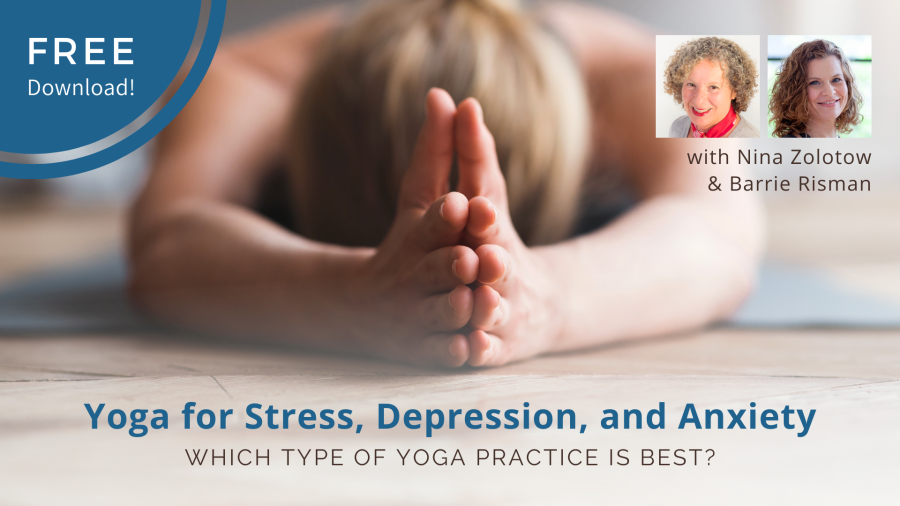Free Download! Yoga for Stress, Depression, and Anxiety - Which Type of Yoga Practice Is Best?
Course Info
- Price:
- $0.00
Nina Zolotow and Barrie Risman
 Nina Zolotow, RYT500, MFA, is Editor-in-Chief and a contributing writer for the Yoga for Healthy Aging blog and is the author of the recently published book Yoga for Times of Change by Shambhala Publications. She is a long-time yoga writer, long-time yoga practitioner, and certified yoga teacher....
Nina Zolotow, RYT500, MFA, is Editor-in-Chief and a contributing writer for the Yoga for Healthy Aging blog and is the author of the recently published book Yoga for Times of Change by Shambhala Publications. She is a long-time yoga writer, long-time yoga practitioner, and certified yoga teacher.... 
What’s yet another reason to practice yoga?
And for yoga teachers, what’s another important reason to keep strengthening your teaching chops?
The lingering COVID pandemic.
In a new study from the University College London, a Covid-19 infection was found to double the risk of mental health problems for people over the age of 52.
“Our study shows that older adults with probable Covid-19 infection experienced higher levels of depression and anxiety . . . compared with those without probable infection,” the researchers noted. “This was evident both in the acute phase of the infection and up to six months later."
The best way to help this group of people isn’t necessarily psychotherapy, the researchers said, but rather alternative methods like yoga, mindfulness, or exercise.
The study involved 5,146 adults between the ages of 52 and 74 who were in the English Longitudinal Study of Ageing.
Already, many people turn to yoga to cope with feelings of stress, depression, and anxiety. But which are the yoga tools that are best to help manage stress, anxiety, and related issues?
Not any type of yoga practice will do, says Nina Zolotow and Barrie Risman in this free download interview. In fact, some types of yoga, or some poses, in particular, can make anxiety and tension worse.
It is very important to learn about what kinds of yoga are calming to the nervous system and actually reduce your stress hormones.
When you struggle with anxiety, it is vital to focus on calming, more gentle physical and breath practices and meditation because they soothe your nervous system.
Above all, don’t approach it as a one-size-fits-all approach. It’s important to develop the sensitivity and the awareness of how what you are doing affects you, Nina and Barrie note.
Explore a large set of tools that will help encourage you to get to know yourself and what works for you, they recommend.
Meet energy with the right kind of energy, and develop sensitivity to how each of the different yoga tools affects you. All of that can help build a practical self-care approach to more effectively manage stress and anxiety.
Curious to learn more? Click above to download this free interview.
For a more in-depth course on the benefits of yoga for anxiety, be sure to check out Nina and Barrie’s course Finding Your Center of Calm: Essential Yoga Self-Care Tools for Anxiety.
Learn how and why yoga practices can be so effective in reducing anxiety, as well as a wide range of yoga practices that can be used as self-care tools to calm down emotionally and physically.